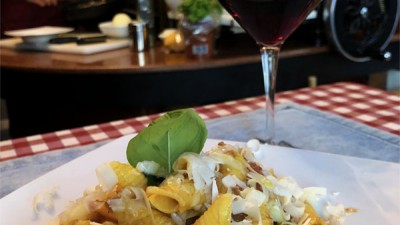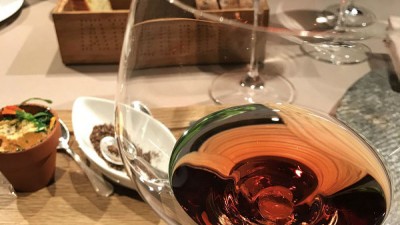Pageou & Ali Güngörmüş: First And Only Turkish Chef With A Michelin Star
The hero of this interesting story which started from Tunceli and has ended up in Germany

The hero of this interesting story which started from Tunceli and has ended up in Germany

On one hand, memories of childhood adorned with country roads, lush fields, cows, horses and sheep; on the other hand, ecstasy of fame brought by the star-awarded restaurant in one of the prosperous districts of Hamburg, several other awards and the adulation…
The hero of this interesting story which started from Tunceli and has ended up in Germany is Ali Güngörmüş…
First Turkish Chef with a Michelin Star
Born in the village of Pageou in Tunceli, Ali Haydar Güngörmüş was just a ten year-old kid when his father eventually took his family with him years after he’d gone to Germany to work as a welder. When he was still trying to deal with the cultural shock, his siblings already began to engage with such jobs as being an electrician, auto-mechanic, secretary and nurse.
When he graduated from secondary school, although he was interested in dancing, he needed to ponder what to do next in a reasonable way. Because, being a dancer wouldn’t let him earn enough money to live a decent life. He needed a highly sought-after paying job instead. With that in his mind, he enrolled in an apprenticeship program and completed his training with a first degree at the age of 17.
When he was going back home on a train at the end of the day in 1995, he came across a job advertisement by Glockenbach (1 star) and applied for the job to start his journey with star-awarded restaurants. After learning the discipline and the basics of his profession from Chef Ederer whom he mentions as his “second father,” he continued his career with Schweizer Stuben (2 stars) and then Tantris where I also have been frequenting for 10 years. Following a heavy training under the legendary chef and also my friend Hans Laans at a restaurant which we might call a “chef factory” since many renowned chefs started their careers with Tantris, he successfully got the title of “head chef” and then he was transferred to Lenbach, a very popular restaurant in Hamburg.
He became widely known at Lenbach thanks to his novel ideas such as “döner deluxe” which was made with entrecote and topped with some foie gras and his specialty tripe broiled with champagne. As when he turned 27, it was time for Ali to breathe life into his next plan: opening his own restaurant.
In the high-toned town of Elbschusse in Hamburg, when he was searching for an ideal place, he found himself looking at Elbe River from the terrace of Le Canard which had been actually closed down a while ago in spite of its 1 Michelin star, and gave a promise to himself that he would either make the restaurant a better place than before or he would quit his plans altogether and he attached the word of “nouveau” to the signboard of the restaurant and got to work with a team of 20 people.
Although people demanded a menu with Turkish dishes at first, he simply rebutted the demands saying “I don’t want to be known as a chef of a döner restaurant!” and created his own menu instead. As he leaned towards Mediterranean cuisine as a new concept, the restaurant managed to get 16 Gault Millau toques and in one year, and won its first Michelin star in 2006 which was celebrated with a banner on which it was written “Welcome to the Michelin Family!” in Turkish surprisingly.
As Ali has been keeping his title as the “First and Only Turkish Chef with a Michelin Star” for 10 years, he thinks that winning a Michelin star is like riding a bike since if you stop making progress, you’ll eventually fall and lose the star. Thus with his unceasing perseverance, he was listed among the “100 Brains that Shape the Future” (originally known as 100 Köpfe von morgen), and finally his book about Mediterranean cuisine has been published and awarded many times both in Germany and other countries.
Pageou and Bistronomy Culture
Pageou is the chef’s second restaurant which he opened in October 2004 due to the high demand and also the place the chef and I finally managed to meet, which was a hard thing to do since the chef has been frequently shuttling between his two restaurants.
With a room for 70 people, Pageou mainly serves dishes from Mediterranean cuisine and has got a more laid-back and cozy atmosphere in comparison with Le Canard thanks to its serving style of “bistronomy.”
Bistronomy is a new rising culinary trend which provides a cozier, fresh and convivial place to enjoy their meals for those people who don’t want to be overwhelmed by the stiff “fine-dining” concept of Michelin restaurants.
Having successfully put the concept of bistronomy into life which I believe will be even more popular in the future, at Pageou, Ali may occasionally alternate between being a waiter servicing the dishes on his own and a sommelier opening a wine bottle for the customers.
With his winsome smile stripped of his ego, and the sparks in his eyes, he unquestionably deserves a huge appreciation for his entrepreneurism. When if you get to see him in the kitchen, you could easily see that he works with German discipline.
As he confesses he still can’t put his finger on why the best restaurant is from Denmark, it is believed that Ali is one of the leading chefs of German cuisine around the globe. Because once imitating France and Spain, today, Germany left those countries behind on many levels except for one that is culinary assets. It is a big minus since Germany couldn’t put up its own cuisine as those countries did.
First off, I’m sorry to say that as the menus of both of the restaurants are centered on seafood, they don’t offer any offal dishes. The reason behind this, although Chef Ali loves offal dishes, he had to take them off the menu since they were rarely demanded by the Bavarians. Otherwise, his motto has been “If you slaughter an animal, you should use everything belonging to it so the killing should be absolutely worth it!” since his childhood. Instead of offal dishes he prefers to serve game meats which include venison, gazelle meat and antelope boosting them with meadow mushroom and white asparagus if they are seasonal.
The percentage of Turkish diners at the restaurant is very low. Unfortunately, among the Turkish customers, some of them are still careless about what they would eat with a motto: “Bring anything you’d like to, Chef!” For this reason, mostly visited by the European, Pageou offers both a Tasting Menu and A la Carte Menu.
Our first dish was sashimi accompanied by quinoa salad and some purple papaya sauce. It was enhanced with a hint of common mallow.
It was followed by trout, my favorite dish of the night. Served with common verbena, carrots, mustard, ginger and a dash of beetroot foam, it was pleasing both to the eyes and to the palates.
The next arrival at the table was the famous Spanish soup, gazpacho. On the top of the soup was burrata cream, cucumber and “serrano” pastrami.
Right after gazpacho; samosa, a type of classical triangular Far Eastern börek, was served. It was filled with chanterelle mushroom, cauliflower with spice and lovage and garnished with some sweet potato cream. Since I found it a bit greasy, it didn’t agree with my palate.
The presentation of grilled octopus included a mullet. As it was garnished with beans, it was perfectly flavored with paprika.
For the lamb dish which is one of my favorite dishes, the lamb are brought from the Bavaria region. It was accompanied by some yoghurt with bulgur rice, green asparagus and mint, a very trendy accompaniment in European restaurants. Although I must agree that I ate better ones, dear Ali’s take on the lamb meat was great for bistronomy.
When we moved onto desserts, the first two were marzipan with almonds and peanuts and kadaifi cake topped with aromatic rose water and yoghurt ice creams which were followed by chocolate cake with raisins as a sweet end to the night.
When I learned the menu was actually paired with a Turkish sparkling wine that is Vinkara Yaşasın. As the first sparkling wine produced in Turkey, it also became my favorite too with its lush taste tickling my palate. It is good news that the gastro-lovers in Hamburg and Munich prefer the Turkish sparkling wine over prosecco. Again the chef states that since Yaşasın is a bit more expensive than the other ones (14 € per glass), some diners gravitate towards cheaper equivalents of the Turkish wine.
Following Vinkara Yaşasın, the other Turkish wines that Pageou offers are Corvus Corpus, Kayra Versus and Kavaklıdere Cote d’Avanos.
Turkey Has a Long Way to Go
As the meal was ended, we grabbed our cigars and digestives and went out to the garden to enjoy a conversation. We both agreed that Turkey has still a long way to go for Michelin star.
In order to refine the crowded and gigantic restaurant culture, first it is a must to train new qualified chefs who are inquisitive about their culinary past and eager to improve upon that legacy and as such, encourage new “chef restaurants” to get into the market.
I’m trying to share with you every experience of mine with the restaurants within the vicinity of Istanbul and Izmir that joined this epicurean movement. For such hopeful small ventures to become bigger and expand, it is crucial to become more knowledgeable about the local ingredients, to be able to interpret them in a different way, and to expand our vision in order to do that.
We have a long way to go; however I’m still hopeful that new young Turkish Chefs will join this movement and achieve great success following the path of dear Chef Ali…
Bon appétit and enjoy the taste of life…
Pageou
www.pageou.de
Kardinal-Faulhaber Strasse 10, 80333 Munich, Germany
+49 89 24231310
Share

Kırmızı kareli örtülerle bezeli birkaç masa, kenardan göz kırpan küçük ama nefis şarap kavı, zihninizi hamakta sallandıracak keyifli bir müzik ve tüm bunlar eşliğinde iki göz ocakta gülerek yemek yapan İtalyan bir şef...

3-star restaurants in Europe usually anchor the showy halls of the most popular hotels…